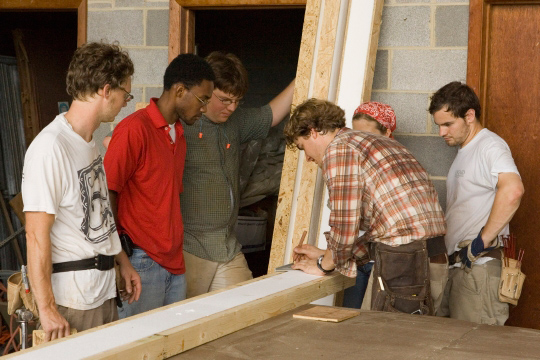The University of Virginia’s new strategic plan – nearing its final draft – will include an increased emphasis on “high-impact educational experiences.” It defines those as experiences that involve undergraduate research, community engagement, global immersion, entrepreneurship or learning in “flipped” classrooms that dedicate classroom time to active learning, from doing group projects to the professor moderating a debate among student teams.
Though the University already offers plenty of high-impact educational experiences, the new strategic plan calls for building on and expanding them and better connecting students with those opportunities, explained Maurie McInnis, a professor of art history in the College of Arts & Sciences who was appointed vice provost for academic affairs in January. She is tasked with developing the new strategy in concert with the Board of Visitors through its Educational Policy Committee and President Teresa A. Sullivan.
“We know from research that these opportunities lead to deeper learning and greater career preparation,” and encourage development of critical thinking and leadership skills, McInnis explained Sept. 20 in a presentation to the board.
The vast majority of U.Va. students report at least one high-impact educational experience during their undergraduate career, according to student surveys, she said. The new strategy aims to increase the proportion of students reporting multiple such experiences.
“For example, about 50 percent of our students report having at least one significant research project, but we’d like to ensure that we have the capacity to offer that to every student,” McInnis said. “To make us distinctive, we aspire to make these experiences available earlier and more broadly. As a result, these experiences would become a defining part of a University of Virginia education.
“By their nature, these high-impact experiences are faculty intensive,” she said. The wave of faculty hires expected over the next decade will help expand offerings, “but we also need to support faculty already on Grounds to make this an important part of their work here.
“This is what faculty do and love to do. This is who we are and what we want to be able to do more of. We just need to put the infrastructure in place to help our faculty do this, and to help our students better connect with these opportunities.”
For instance, every year hundreds of students work directly with a faculty member on his or her academic research. This year, a new program placed 12 first- and second-year students in paid research opportunities with faculty members across four schools. “This is a program we’d like to grow to be able to engage significantly more first- and second-year students in research, because we know that this engagement changes their ultimate academic and career decisions.”
Faculty members who want to experiment with “flipped” classrooms are receiving growing support from the Teaching Resource Center’s Course Design Institute, recently complemented by the president’s “Hybrid Challenge for Engaged Courses.” Similarly, many faculty are experimenting with MOOCs – massive open online courses – through U.Va.’s partnership with Coursera.
McInnis outlined for the board a few examples of the sorts of high-impact educational experiences already taking place “that we would like to make more broadly available.”
The School of Nursing has a program that pairs third- and fourth-year nursing students with doctoral students to solve patient safety issues in the hospital. A series of EcoMod projects have involved more than 400 students in creating sustainable modular and renovated housing units in Charlottesville and in Southside Virginia. The School of Engineering and Applied Science’s Global Ingenuity Project matches a group of U.Va. and German engineering students to solve an open-ended design problem for an industry client such as Volkswagen. Faculty and students from five schools have partnered with the University of Venda in South Africa on a sustained research and community engagement project to improve water quality and health in Limpopo.
Archie Holmes, a professor in the Department of Electrical and Computer Engineering and newly appointed associate provost who is working with McInnis on the new strategy, summarized the strategy goal to the Board of Visitors on Sept. 20: “Our challenge is to have the capacity in faculty and resources to enable all students to benefit from high-impact student experiences.”
The high-impact experiences strategy is one of 15 strategies supporting five pillars in the draft strategic plan. All are designed to build on U.Va.’s unique strengths or identify new areas in which the University can set itself apart from peers and competitors.
Plan development has been ongoing for more than a year, and a final draft is expected to be presented to the board in November.
Media Contact
Article Information
October 2, 2013
/content/strategic-plan-calls-more-emphasis-high-impact-educational-experiences

